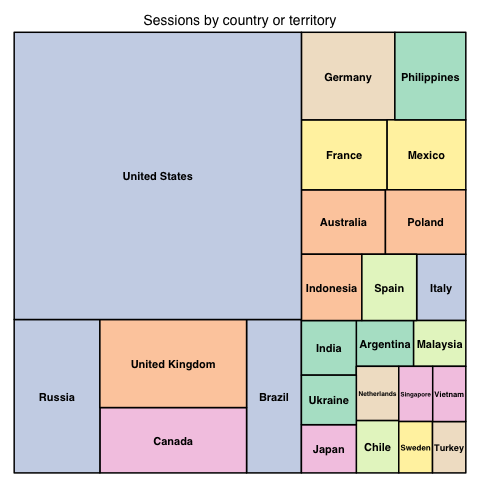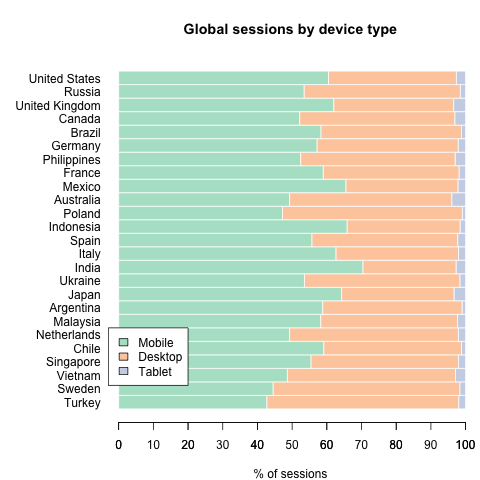There has never before been a time when our digital habits have so radically changed in a short period. How we experience streaming media, games, and the world outside our homes have dramatically shifted. Even if — over the last 6 months — we have gone outside less often, our relationships with computers and mobile phones have also changed. We would like to follow up on some of our earlier bulletins and describe the trends before and during the global pandemic, and where we are projecting they are going in 2021.
Spoiler alert: the mobile revolution continues, stronger than ever.
Readers on different platforms
Fandom users have crafted a fantastic assortment of wikis since the beginning of the platform. The care and voice of wikis is evident in the rich experiences shown on desktop monitors. Savvy wiki leaders create tasteful experiences, many of them changing over time to reflect modern web experiences. Fandom's upcoming skins on mobile and desktop devices are evolving with the web, and it may help to explain why we are focusing first on the mobile experience as we develop.
The desktop experience has plenty of users, but the mobile platform simply has more of them. We have been talking about the acceleration of reading on mobile devices since we noted the trend back in 2015. For websites throughout the internet, mobile devices are the preferred and fasted growing method of experiencing the web.
Rather than getting buried in browser tabs, some users opt for keeping a cleaner experience in a standalone mobile app. In the last two years, Fandom has sunset or eliminated our outdated individual community mobile apps in favor of a consolidated Fandom app. The Fandom app is a very popular experience, allowing readers to search through and explore a massive number of wikis in a convenient package. For reference: because of how content is processed and sent to the app, viewing statistics using the app are generally tracked alongside the desktop and mobile web views and are presented here in the same totals.
Mobile sessions
Looking at the number of individual visits (also known as "sessions") over time, the use of mobile devices has steadily increased.
In presenting the data in today's post, some of those reading it might be interested in how we gather the figures we're writing about. Because we want to see how often mobile is being used versus other methods, we're not making a distinction in this post between heavy users (those that visit frequently, or on a lot of pages at once) and light users (those that may look at Fandom occasionally or casually), nor at how long their visits lasted or how many pages they looked at. A single user under these rules could be counted multiple times if they visit from different devices over several days. Multiple visits from the same user on the same device in a single day count as a single session.
| Platform | NOV 2016 | NOV 2017 | NOV 2018 | NOV 2019 | NOV 2020 |
|---|---|---|---|---|---|
| Mobile | 45.45 | 49.56 | 52.97 | 60.12 | 57.26 |
| Desktop | 47.44 | 44.46 | 41.20 | 36.00 | 40.36 |
| Tablet | 7.11 | 5.97 | 5.83 | 3.88 | 2.38 |
We also wanted to examine how interactions changed during the 2020 global pandemic. We expected that desktop usage would increase during the period when many were sheltered in place or reducing how often users left their homes. Contrary to our expectations, the percentage of users on each device class did not significantly change (within a single percentage point) in the months before, during, and after the six-month (March 15 to September 15) lockdown period. However, we note that desktop use is higher in November 2020 than it was in November 2019; we believe this is due to more students already on desktop for their school days.
| Platform | 2019 to 2020 |
|---|---|
| Mobile | +55.74% |
| Desktop | +44.32% |
| Tablet | -12.62% |
We see that Fandom (across all wikis) is a more popular destination than it was last year (2019), having picked up around 47.12% more users across all devices. We significantly increased our number of users on both mobile and desktop devices when compared to the same nine-month period last year, and use of tablets has fallen.
Global audiences
Fandom has a strong active user base from all over the world, who engage with communities in several languages no matter where they are.
The United States represents the most significant part of our global audience. More than 1/3 of our readers in any single month (the graph shown is for November 2020) come from the United States. The rest of the top 25 are shown in this graph in proportion based on how many sessions come from each territory. Unfortunately, the remaining territories not in the graph above represent too small portion of sessions to properly illustrate. Why is this important? Because device usage varies quite a bit depending on the habits of users in each territory.
Editing on mobile
With the update of Fandom's wikis to the Unified Community Platform (UCP), we have reintroduced the mobile editing experience. It now uses the latest editing methods from the designers of the MediaWiki platform. The majority of article edits (particularly first time edits) on Wikipedia use the same editor, in visual mode. Gamepedia users also remarked on the ease of editing using the mobile interface, so Fandom made it a high priority to bring to the UCP. We are continuing to improve the editing experience on mobile, for articles and non-article pages (such as JavaScript or Project pages). Given the rapid development changes, we are not presenting usage data until we are sure all features are stable.
Why edit on mobile at all? Wiki mobile contributors tend to edit small items as soon as they encounter typos and other small issues in text, or they add data while gaming or using their mobile devices as "second screens". Using new tools like TemplateData to enhance the experience, the mobile Visual Editor helps make adding links and filling templates a comfortable one-handed experience without needing to track down special characters like brackets and braces on mobile keyboards.
Performance and cross-platform content
Fandom's current mobile skin — in use in some variation since 2015 — streamlines the rich content experience on desktop into an experience mobile devices can handle well and mobile users will find familiar. The interaction with article pages (and how to get to them) is reshaped to be comfortable and intuitive for small device screens, and content is simplified for performance and ease of reading. The majority of high-traffic sites on the web change how they supply pages when they detect their readers are using a mobile device, and reduce the number of elements on the screen at a given time; sometimes they also increase the contrast between text and background so that the text is most readable on a small screen.
The term Fandom uses to describe how content works across platforms is "portability". Using portable elements and practices enhances the experience for all users, as these elements natively flow even on small viewports. Portable pages also tend to be accessible to those exploring wikis with sensory disabilities. Using these elements has a secondary effect of improving readability for search engines, which increases the likelihood of that software understanding what is written. This comprehension, in turn, boosts search engine ranking because it can better address questions information seekers have.
While a big part of Fandom is in the voice and personality of individual wikis through style and customization, this is not easy to translate into a mobile experience. CSS, the digital language that styles the look and feel of a web page, is aggressively stripped by the mobile skin. We will describe more about the new ways we are shaping the look of our mobile experience and how it can be customized very soon!
Finally, JavaScript is a tool that can add interactivity and additional functions to wikis. Most of these "widgets" do not translate well to a mobile form factor. As more are inserted into pages viewed on devices with reduced capabilities and bandwidth, the worse performance becomes. JavaScript and mobile devices, even in 2021, simply do not mix well inside browsers. Therefore, we continue to limit the amount of JavaScript additions that are supplied to mobile devices.
Many of these restrictions and features are more relevant to us and all our wikis as the web evolves because search engines (namely Google) account for the majority of discoveries and incoming traffic to our wikis. Google is making very public changes in the way they examine sites, and is changing to a model where they examine and incorporate mobile content nearly exclusively. This means whatever Google does not encounter on mobile, as a logged-out user, will not be contributed to search rankings.
Network speeds
It may not surprise you that not all internet connections are equal in quality or reliability. Users with strong broadband connections at home in a well-developed suburb are likely to have a very different speed experience than those in a rural area or a crowded subway car.
In performance testing, Fandom takes into account these variations in connection and classifies them into three network grades. When we create components that appear on screen, our engineers and developers make sure that they perform well regardless of the quality of the connection.
We will be talking soon about how these insights affect you and how you can help your own wikis to find and keep audiences.
Moving forward
No matter how you experience wikis, the mobile phenomenon can not be safely ignored. The shifting landscape of the web means that the small screen is the strongest and growing. Let's look forward to 2021!
Click here to follow the Fandom staff blog.
Click here to sign up for the From the Desk of Community email newsletter.
Join our Official Discord server for registered editors!





